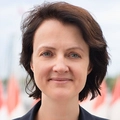How is Disability Portrayed in Contemporary Culture?
DOI:
https://doi.org/10.21036/LTPUB10657Researcher
Professor Susanne Hartwig holds the Chair of Romance Literatures and Cultures at the University of Passau, Germany. With expertise in French, Spanish and Portuguese literary and cultural studies, Professor Hartwig’s research interests also include disability studies, theories of cognition and communication and the links between her core discipline and mathematics. Between 2011 and 2015, she was deputy chairperson of the German Hispanic Studies Association and, in 2008, Susanne Hartwig (with mathematician Stefan Siegmund) was a prize winner in the Heads and Tails competition sponsored by the German Federal Ministry of Education and Research.

Original Publication
¿Discapacidad? Literatura, Teatro y Cine Hispánicos Vistos Desde los Disability Studies
Alba Gómez García
Published in
Espacio(s) Teatrale(s) y Diversidad Funcional
Susanne Hartwig
Published in
La Discapacidad en Escena. Una Búsqueda a Escala Europea
Susanne Hartwig
Published in
Citation
Susanne Hartwig,
Latest Thinking,
How is Disability Portrayed in Contemporary Culture?,
https://doi.org/10.21036/LTPUB10657,
Credits:
© Susanne Hartwig
and Latest Thinking
This work is licensed under CC-BY 4.0
